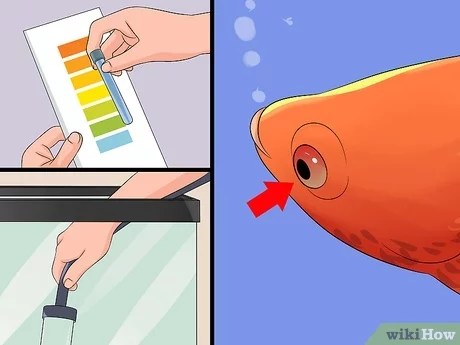Betta fish, also known as Siamese fighting fish, are popular pets due to their vibrant colors and unique personalities. However, caring for a betta fish can be challenging, especially if your fish becomes sick. If you notice that your betta fish is not acting like its usual self, it might be time to revive it. In this article, we will discuss the steps you can take to help your betta fish recover and thrive once again.
From changing the water in your tank to adjusting the temperature and adding specific medications, we will cover everything you need to know to revive your betta fish. With a little patience and the right care, your betta fish can make a full recovery and continue to bring joy to your life for years to come. So, let’s dive in and learn how to revive a betta fish!
How to Revive a Betta Fish?
- Check the water parameters of the tank to ensure they are within the appropriate range for bettas.
- Do a partial water change of about 25% to 50% of the tank’s water volume.
- Use a water conditioner to remove any harmful chemicals in the water.
- Ensure the temperature of the water is between 76°F to 82°F.
- Feed the betta fish small amounts of food twice a day.
- Observe the fish for any signs of illness or injury and treat accordingly.

Reviving a Betta Fish: Tips and Tricks
Betta fish, also known as Siamese fighting fish, are hardy and colorful fish that make great pets for beginners. However, they can become sick or stressed, which can lead to a decline in their health and wellbeing. If you notice that your betta fish is not swimming as much, has a lack of appetite, or is showing signs of stress, then it may be time to take action and revive your betta fish. Here are some tips and tricks to help you revive your betta fish and restore its health.
1. Identify the Problem
The first step in reviving a betta fish is to identify the problem. There are several reasons why your betta fish may be sick or stressed, including poor water quality, overfeeding, overstocking, or a lack of proper care. Once you have identified the problem, take the necessary steps to address it. For example, if your betta fish is suffering from poor water quality, then perform a water change and add a water conditioner to neutralize the chlorine and other harmful chemicals.
2. Check Water Parameters
Betta fish thrive in a specific water environment, so it is crucial to check the water parameters regularly. The ideal water temperature for betta fish is between 75 to 80 degrees Fahrenheit, and the pH level should be between 6.5 to 7.5. Check the ammonia, nitrite, and nitrate levels regularly as well, as high levels of these chemicals can harm your betta fish.
3. Quarantine Sick Fish
If your betta fish is showing signs of illness, then it is essential to quarantine it immediately. This will prevent the spread of disease to other fish in your tank. Use a separate tank or container with clean water, and add a heater and filter to maintain a stable environment. Treat the sick fish with medication as prescribed by a veterinarian or pet store staff.
4. Provide a Balanced Diet
Betta fish require a balanced and nutritious diet to thrive. Feed your betta fish a high-quality pellet or flake food that is specifically formulated for betta fish. Avoid overfeeding, as this can lead to bloating and constipation. You can also supplement your betta fish’s diet with frozen or live foods, such as brine shrimp or bloodworms, for added variety and nutrition.
5. Decorate the Tank
Betta fish enjoy a decorated tank with hiding places and plants. Adding decorations, such as caves, rocks, or plants, can help reduce stress and provide a sense of security for your betta fish. Just make sure to choose decorations that are safe for your fish, as some decorations can leach harmful chemicals into the water.
6. Avoid Overcrowding
Overcrowding can lead to stress and disease in betta fish. The general rule of thumb is to have one betta fish per tank, with a minimum tank size of 5 gallons. If you want to add other fish to your tank, make sure to research their compatibility with betta fish and provide enough space for each fish to swim and hide.
7. Maintain Good Water Quality
Maintaining good water quality is essential for the health of your betta fish. Perform regular water changes, test the water parameters regularly, and add a water conditioner to neutralize harmful chemicals. Avoid using harsh chemicals or detergents to clean the tank, as these can harm your fish.
8. Monitor Behavior
Keep an eye on your betta fish’s behavior and look for signs of stress or illness. If you notice any changes in behavior or appearance, then take action immediately to address the problem. Some signs of stress include lethargy, loss of appetite, or hiding in the corners of the tank.
9. Use Medication Carefully
If your betta fish requires medication, then use it carefully and as prescribed. Follow the instructions on the medication label, and do not overmedicate. Be aware that some medications can harm beneficial bacteria in your tank, which can lead to further problems.
10. Seek Professional Help
If your betta fish is not responding to treatment or is showing severe symptoms, then seek professional help from a veterinarian or pet store staff. They can provide you with expert advice and medication to help revive your betta fish.
In conclusion, betta fish require proper care and maintenance to thrive and live a long and healthy life. By identifying the problem, maintaining good water quality, providing a balanced diet, and monitoring behavior, you can revive your betta fish and restore its health. Remember to always seek professional help if needed, and enjoy your beautiful and colorful betta fish.
Frequently Asked Questions
Betta fish are popular pets due to their vibrant colors and unique personalities. However, sometimes these fish can become sick or stressed, leading to a decline in their health. If you are wondering how to revive a betta fish, read on for some helpful tips.
What are the signs that a betta fish is in distress?
Betta fish that are in distress may exhibit a variety of symptoms. Some signs to watch out for include lethargy, loss of appetite, gasping for air at the surface of the water, and unusual swimming patterns. If you notice any of these symptoms, it is important to take action as soon as possible to prevent further harm to your fish.
In many cases, stress is the underlying cause of these symptoms. You can help reduce stress in your betta fish by providing a clean and comfortable environment, avoiding overfeeding, and minimizing disturbances in their surroundings.
How can I improve the water quality in my betta fish’s tank?
Poor water quality is a common problem in betta fish tanks. To improve the water quality, start by performing regular water changes. Aim to change out 25-50% of the water in the tank every week, using a siphon or other appropriate equipment to remove any debris or waste.
You can also add beneficial bacteria to the tank to help break down waste and keep the water clean. These bacteria can be found in products like Bio-Spira or by using live plants in the tank. Finally, make sure that the temperature and pH levels in the tank are appropriate for your betta fish species.
What should I feed my betta fish to help them recover?
A well-balanced diet is essential for helping your betta fish recover from illness or stress. In general, betta fish should be fed a variety of high-quality foods, including pellets, flakes, and frozen or live foods like brine shrimp or bloodworms.
To help your betta fish recover, you may want to consider adding some supplements to their diet. For example, garlic is believed to have antibacterial properties that can boost the immune system, while betta-specific vitamins can help to improve overall health and vitality.
How can I create a comfortable environment for my betta fish?
Betta fish thrive in environments that mimic their natural habitat. To create a comfortable living space for your fish, start by choosing an appropriately sized tank and providing plenty of hiding places and plants for them to explore.
Additionally, make sure that the temperature and lighting in the tank are appropriate for your betta fish species. Finally, be mindful of any potential stressors in the environment, such as loud noises or sudden movements, and try to minimize them as much as possible.
When should I seek professional help for my betta fish?
In some cases, home remedies may not be enough to revive a betta fish. If you have tried the above tips and your fish is still exhibiting symptoms of illness or stress, it may be time to seek professional help.
A veterinarian who specializes in fish health can provide a thorough examination and offer treatment options that may not be available to home aquarists. Additionally, they can help you identify any underlying issues that may be contributing to your betta fish’s poor health and offer advice on how to prevent future issues.

How To Save A Dying Betta | #Inactive #Betta
In conclusion, reviving a betta fish is a delicate process that requires patience and attention to detail. By ensuring that the water quality is optimal, providing proper nutrition, and maintaining a suitable environment, you can give your betta fish a new lease on life. However, it’s important to keep in mind that prevention is always better than cure. Regularly cleaning the tank, monitoring the water parameters, and keeping an eye out for any signs of illness can help prevent your betta fish from becoming sick in the first place.
Remember, a healthy betta fish is a happy betta fish. By following the tips outlined in this guide, you can help your fish thrive and live a long and fulfilling life. Don’t be discouraged if it takes some time for your betta fish to recover – with patience and perseverance, you can nurse them back to health and enjoy many happy years together. So go ahead and put these tips into practice, and watch your betta fish flourish before your eyes!
